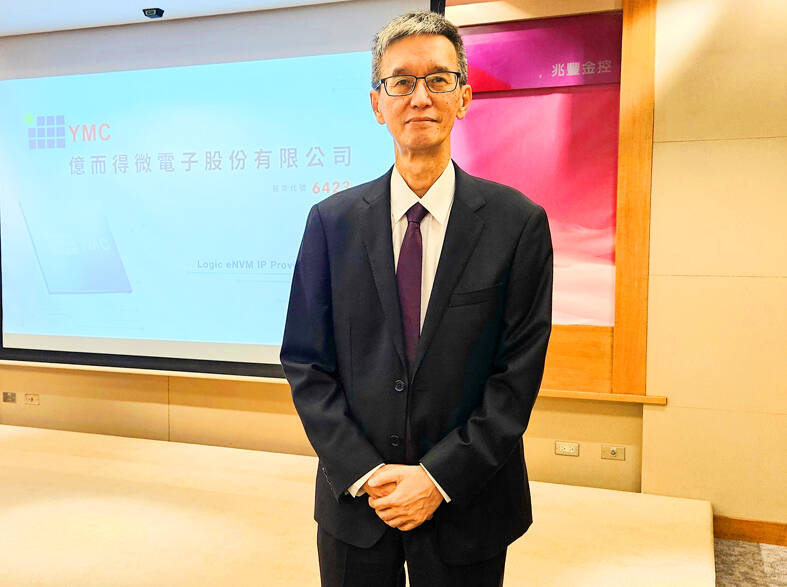Yield Microelectronics Corp (億而得) yesterday said it would debut on the Taipei Exchange (TPEX) next month at the earliest, as it aims to raise funds for expansion plans.
The Hsinchu-based silicon intellectual property developer focuses on developing multi-time programmable embedded non-volatile memory (eNVM) chips used in microcontroller units (MCUs), driver ICs and power management chips.
The company has received regulatory approval to issue 2.62 million new shares at a tentative price of NT$65 each.

Photo: Vanessa Cho, Taipei Times
Yield Microelectronics generates revenue primarily by collecting license fees from its customers, which are mostly foundry service providers such as GlobalFoundries Inc, Vanguard International Semiconductor Corp (世界先進) and Taiwan Semiconductor Manufacturing Co (台積電).
License income made up about 75 percent of its revenue last year.
The company, which holds a 2.5 percent share of the global eNVM market, expects revenue this year to expand by at least 22 percent to the peak level of NT$229 million (US$7.02 million) it recorded in 2022, due to a recovery in the wafer foundry segment.
“It looks like the fourth quarter of last year was the trough for this downcycle, as most foundry companies reported a slight increase or flat revenue in the first quarter,” Yield Microelectronics chairman Daniel Huang (黃文謙) told reporters at a media briefing in Taipei.
That bodes well, as foundry companies are likely to sign more license agreements with the company, Huang said.
By product segment, the company expects low-end MCUs and driver ICs to be this year’s major growth drivers, given that customers are expected to report increased wafer production this year, Huang said.
Chinese foundry companies are Yield Microelectronics’ major customers in terms of MCU business.
Last year, eNVM silicon intellectual property contributed the most, or 34 percent, to the company’s overall revenue.
High-end power management ICs made up 25 percent of revenue, while low-end power-managed ICs accounted for 14 percent and 12 percent came from display driver ICs.
Compared with local eNVM intellectual property developer eMemory Technology Inc (力旺), Huang said his company focuses on developing intellectual property for reprogrammable memory, rather than one-time programmable (OTP) memory as eMemory has been doing.
In an attempt to grow its revenue, Yield Microelectronics is shifting some of its resources to develop intellectual property for OTP memory, Huang said.
The company aims to expand OTP memory’s contribution to revenue to 40 percent within four years, compared with less than 10 percent now, he said.
The firm’s net profit last year plummeted about 56 percent to NT$32.02 million from NT$72.96 million in 2022, while earnings per share dropped to NT$1.19 from NT$2.72, company data showed.

Taiwan Semiconductor Manufacturing Co (TSMC, 台積電) secured a record 70.2 percent share of the global foundry business in the second quarter, up from 67.6 percent the previous quarter, and continued widening its lead over second-placed Samsung Electronics Co, TrendForce Corp (集邦科技) said on Monday. TSMC posted US$30.24 billion in sales in the April-to-June period, up 18.5 percent from the previous quarter, driven by major smartphone customers entering their ramp-up cycle and robust demand for artificial intelligence chips, laptops and PCs, which boosted wafer shipments and average selling prices, TrendForce said in a report. Samsung’s sales also grew in the second quarter, up

On Tuesday, US President Donald Trump weighed in on a pressing national issue: The rebranding of a restaurant chain. Last week, Cracker Barrel, a Tennessee company whose nationwide locations lean heavily on a cozy, old-timey aesthetic — “rocking chairs on the porch, a warm fire in the hearth, peg games on the table” — announced it was updating its logo. Uncle Herschel, the man who once appeared next to the letters with a barrel, was gone. It sparked ire on the right, with Donald Trump Jr leading a charge against the rebranding: “WTF is wrong with Cracker Barrel?!” Later, Trump Sr weighed

LIMITED IMPACT: Investor confidence was likely sustained by its relatively small exposure to the Chinese market, as only less advanced chips are made in Nanjing Taiwan Semiconductor Manufacturing Co (TSMC, 台積電) saw its stock price close steady yesterday in a sign that the loss of the validated end user (VEU) status for its Nanjing, China, fab should have a mild impact on the world’s biggest contract chipmaker financially and technologically. Media reports about the waiver loss sent TSMC down 1.29 percent during the early trading session yesterday, but the stock soon regained strength and ended at NT$1,160, unchanged from Tuesday. Investors’ confidence in TSMC was likely built on its relatively small exposure to the Chinese market, as Chinese customers contributed about 9 percent to TSMC’s revenue last

HEADWINDS: Upfront investment is unavoidable in the merger, but cost savings would materialize over time, TS Financial Holding Co president Welch Lin said TS Financial Holding Co (台新新光金控) said it would take about two years before the benefits of its merger with Shin Kong Financial Holding Co (新光金控) become evident, as the group prioritizes the consolidation of its major subsidiaries. “The group’s priority is to complete the consolidation of different subsidiaries,” Welch Lin (林維俊), president of the nation’s fourth-largest financial conglomerate by assets, told reporters during its first earnings briefing since the merger took effect on July 24. The asset management units are scheduled to merge in November, followed by life insurance in January next year and securities operations in April, Lin said. Banking integration,